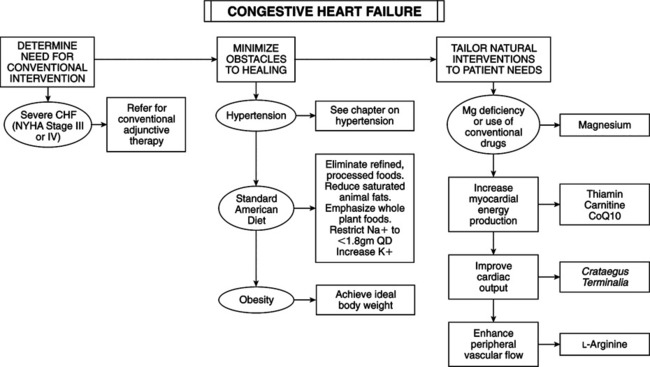• Left ventricular failure: exertional dyspnea, cough, fatigue, orthropnea, cardiac enlargement, rales, gallop rhythm, and pulmonary venous congestion. • Right ventricular failure: elevated venous pressure, hepatomegaly, dependent edema. • Left and right ventricular failure: combinations of above. • Diagnosis confirmed by echocardiograph. Stages of Congestive Heart Failure as Defined by the New York Heart Association (NYHA) • Causes of CHF: long-term hypertension, previous myocardial infarction, disorder of heart valve, cardiomyopathy, and chronic lung disease. • Precipitating or exacerbating factors: increased demand (anemia, fever, infection, fluid overload, increased sodium (Na) intake, high environmental temperature, renal failure, hepatic failure, thyrotoxicosis, arteriovenous shunt, respiratory insufficiency, emotional stress, pregnancy, obesity), arrhythmias, pulmonary embolism, alcohol use, nutrient deficiency, uncontrolled hypertension, drugs (beta-adrenergic blockers, antiarrhythmic drugs, Na-retaining drugs [steroids, nonsteroidal antiinflammatories]). • Consequences of reduced cardiac output (CO): reduced renal blood flow and glomerular filtration, causing Na and fluid retention. Activation of renin-angiotensin-aldosterone (RAA) system increases peripheral vascular resistance, ventricular afterload, and levels of circulating vasopressin, a vasoconstrictor and antidiuretic. • Compensatory mechanisms for reduced CO: tachycardia, increased sympathetic nervous system activation, ventricular dilation, and hypertrophy. These are a mixed blessing; increased sympathetic activity increases CO by increasing HR and force of contraction but it also increases vascular resistance. • Signs and symptoms of CHF: depend on which ventricle has failed; left, pulmonary congestion and edema; right, systemic venous congestion and peripheral edema. Weakness, fatigue, and shortness of breath (SOB) are common to both as is biventricular failure.
Congestive Heart Failure
DIAGNOSTIC SUMMARY
Stage I
Symptom free at rest and with treatment
Stage II
Impaired heart function with moderate physical effort; SOB with exertion common; no symptoms at rest
Stage III
Even minor physical exertion results in SOB and fatigue; no symptoms at rest
Stage IV
Symptoms (SOB) and signs (lower extremity edema) present when patient is at rest.
GENERAL CONSIDERATIONS

Stay updated, free articles. Join our Telegram channel

Full access? Get Clinical Tree


